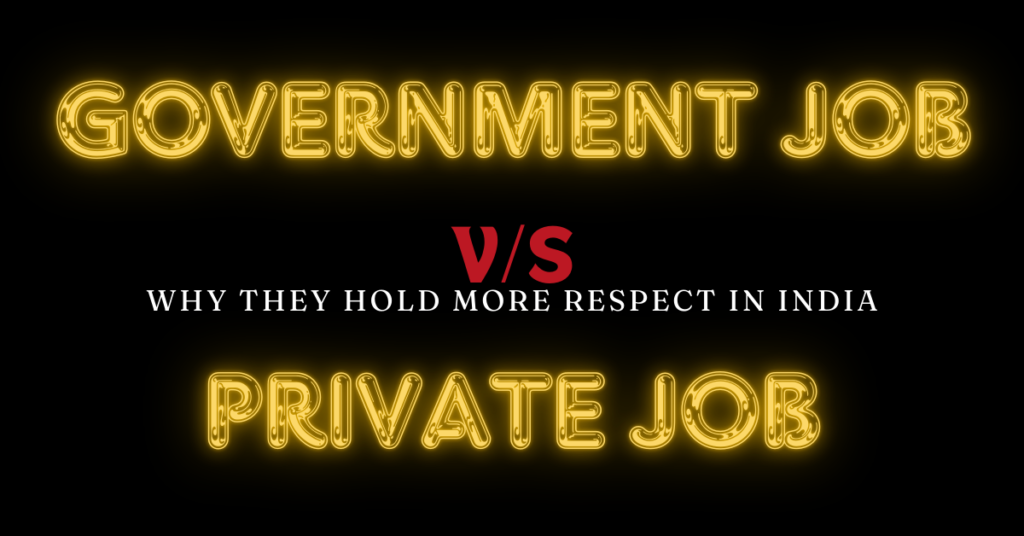
Government Jobs vs. Private Sector: Why They Hold More Respect in India
In India, the age-old debate over the value of jobs compared to private sector employment creates heated discussions among, job seekers, and career. While private sector jobs certainly offer rapid growth appealing salaries, there remains an undeniable reverence to government jobs and the examinations that pave the way to them. This article aims to explore the cultural, economic, and social factors that contribute to the heightened prestige of government in India.
Stability Factor: Government Jobs Offer Security
One of the primary reasons government jobs are cherished in India is the job security they provide. In a country where economic fluctuations can lead to sudden layoffs in the private sector, government employment represents stability and longevity.
Long-Term Security
- Pension Plans: Government employees typically enjoy favorable pension schemes, ensuring a safety net after retirement. This long-term financial security is absent in many private organizations.
- Job Guarantee: Unlike in the private sector, where companies routinely restructure and downsize, government jobs do not face the same volatility. This assurance helps individuals plan their lives, from buying homes to planning for children’s education.
Social Status and Prestige
Beyond monetary benefits, government jobs command a certain level of respect and social stature in Indian society. The deeply ingrained cultural
norms in India contribute significantly to this perception.
“In India, many still believe that a Government Job is a symbol of social status and security.”
Societal Respect
- Cultural Legacy: Historically, government positions were regarded as prestigious due to their association with authority and service. Families often celebrate the success of one member acquiring a government job.
- Public Perception: Professional roles in education, law enforcement, and healthcare under government frameworks are often seen as noble. They are viewed as service-oriented careers—not just jobs, but vocations committed to societal welfare.
Examples of Celebrated Government Roles
- Teachers: Government school teachers play a pivotal role in shaping the future generation and are respected within communities.
Civil Services: The Indian Administrative Service (IAS) holds a prominent place in society, with aspirants often viewed as aspiring leaders of the nation.
The Exam Challenge: A Stepping Stone to Respect
Cracking government exams, such as the UPSC or SSC, requires immense dedication, discipline, and intelligence. This rigorous selection process adds to the allure of government jobs.
Competitive Nature
- High Qualification Standards: The examinations are fiercely competitive, attracting thousands of candidates. The respect garnered by those who succeed represents not only personal achievement but also academic excellence.
- Considerable Preparation: A successful government job candidate often invests years in preparation—this dedication commands admiration.
“Passing a competitive exam denotes not just knowledge, but persistent effort and mental resilience.”
Economic Benefits: Attractive Pay and Perks
While many may argue that private sector jobs typically offer higher base salaries, government jobs provide unique economic advantages that can enhance the overall financial picture.
Comprehensive Benefits
- Allowances: The structured pay scales in government jobs often include benefits such as housing, travel, and medical allowances that can substantially boost overall income.
- Regular Pay Scale Revisions: Salary hikes and allowances are regularly reviewed and adjusted, ensuring that government employees keep pace with inflation and rising living costs.
Work-Life Balance
Government jobs often pride themselves on providing a balanced work-life dynamic compared to the demanding hours of the private sector.
Flexible Hours and Holidays
- Fixed Hours: Many government employees benefit from fixed work hours, making it easier to manage personal commitments and family life.
- Public Holidays: Ample vacation days and holiday schedules are a significant draw, allowing government workers to spend quality time with family or pursue personal interests.
Conclusion: The Value of Choice
Ultimately, the respect and value placed on government jobs in India stem from a combination of job security, societal status, economic benefits, and a balanced lifestyle. Understanding these factors can help individuals make informed choices about their career paths.
Whether you’re contemplating a government job or a career in the private sector, it’s essential to consider what aligns best with your values, lifestyle, and long-term goals. In a fast-paced world with evolving job landscapes, the question remains: What will you choose for your future?
